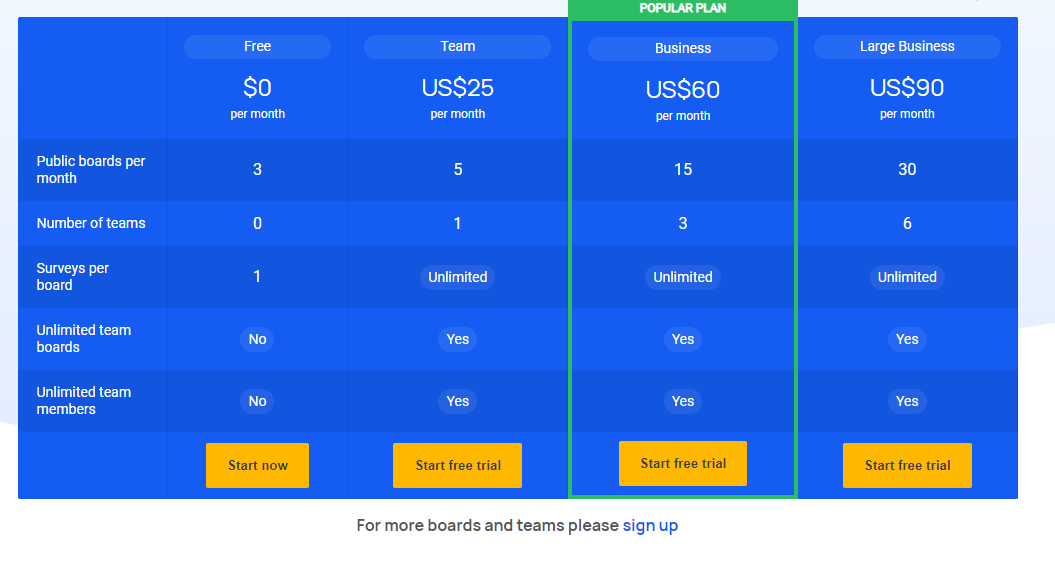Helpful summary
- Overview: This article introduces you to ten of the best Agile retrospective tools on the market. We compare them based on features, pricing, pros, and cons to help you make the right call.
- Why you can trust us: Teaminal is an all-in-one Agile meeting tool that’s trusted by thousands of high-performing teams—we know what works when it comes to Agile retrospective tools.
- Why this is important: A great tool contributes to a great team, and Agile retrospective tools are essential for continuous improvement. By using the right tool, you can make your retrospectives more effective and efficient.
- Action points: Our recommendations are Teaminal, Parabol, Retrium, GoRetro, Metro Retro, EasyRetro, Scatterspoke, TeamRhythm by Easy Agile, Reetro, and RetroTool.
- Further research: Check out our blog for more great tool recommendations.
Continuous improvement is a core piece of the Agile puzzle—and retrospectives are where the bulk of that improvement takes place. As a team, it’s important to constantly reflect on your processes and find ways to improve them.
That’s where retrospective tools come in.
These tools are designed specifically for Agile teams to facilitate their retrospectives and help them achieve their continuous improvement goals. In this Teaminal guide, we will explore some of the best free retrospective tools on the market, including their features, pricing, pros, and cons.
Let’s get started.
Why listen to us?
Teaminal is trusted by thousands of distributed Agile teams at companies like Hello Fresh, Medium, and Workday. Our quick, painless, Slack-based retrospectives help you collect actionable feedback and ideas from your team.

But before we dive into the tools, let’s first understand what a retrospective is and why it’s important for teams.
What is an Agile retrospective tool?
A retrospective tool is a tool that Agile teams can use to:
-
Gather feedback and insights from team members during retrospectives
-
Visualize data in a way that is easy to understand and analyze
-
Facilitate discussions about team processes, communication, and ways to improve
-
Track action items and follow-up tasks from previous retrospectives
Having a dedicated retrospective tool can make it much easier to conduct effective retrospectives, as opposed to using a simple spreadsheet or a whiteboard. These tools often offer various features such as customizable templates, automatic data analysis and reporting, and integration with other project management tools.
Teaminal is a great example.

Our async retrospective feature allows you to run retro meetings through Slack—allowing your team to contribute when they’re able. Recently completed work is pulled in for context and the discussion is saved for future reference.
Why are Agile retrospective tools important?
-
Simplify continuous improvement: Continuous improvement is a core Agile principle—but it’s hard to do without data. Agile retrospective tools collect and organize data from sprints, allowing teams to easily identify areas for improvement and make data-driven decisions.
-
Facilitate open communication: Agile retrospective tools provide a structured platform for team members to share their thoughts, ideas, and feedback. This helps create a safe space for open and honest communication, which is crucial for continuous improvement and team building.
-
Increase efficiency: By automating the process of collecting and organizing data, Agile retrospective tools save time and effort for both team members and facilitators. This allows more focus on analyzing the data and making actionable improvements.
-
Improve remote collaboration: With the rise of remote work, having effective tools for virtual collaboration has become even more important. Agile retrospective tools allow distributed teams to collaborate in real-time.
Criteria to consider when looking for Agile retrospective tools
-
Ease of use: Want your team to get excited about retrospectives? Choose a tool that’s ease to learn, easy to use, and that actually streamlines the retrospective process. Look for features such as drag and drop functionality, templates, and user-friendly interfaces.
-
Integration with other tools: It’s likely that your team is already using various tools to manage projects, communicate, and track progress. Look for Agile retrospective tools that integrate with these existing tools to streamline processes and avoid duplicate work (like Teaminal through our Slack integration).
-
Cost: While there are many free retrospective tools available, it’s important to consider the overall cost and value of the tool. Some paid tools may offer additional features or support that can greatly benefit your team’s retrospectives.
-
Security: As with any online tool, security should be a top consideration when choosing an Agile retrospective tool—especially if you’ll be discussing sensitive information during your retrospectives. Look for tools that offer strong encryption and data protection measures to ensure the safety of your team’s data.
10 best Agile retrospective tools
-
Teaminal: Best Agile retrospective tool overall.
-
Parabol: Best for running efficient meetings.
-
Retrium: Best for generating insights into team behavior.
-
GoRetro: Best for those looking for a simple yet effective tool.
-
Metro Retro: Best for simple digital whiteboard.
-
EasyRetro: Best for planning, executing, and managing retrospectives.
-
Scatterspoke: Best for running remote retrospectives with ease.
-
TeamRhythm by Easy Agile: Best for
-
Reetro: Best for celebrating successes.
-
RetroTool: Best for real-time online retrospectives.
1. Teaminal
Teaminal is an all-in-one Agile meeting tool that supports quick, impactful async retrospectives directly in Slack.
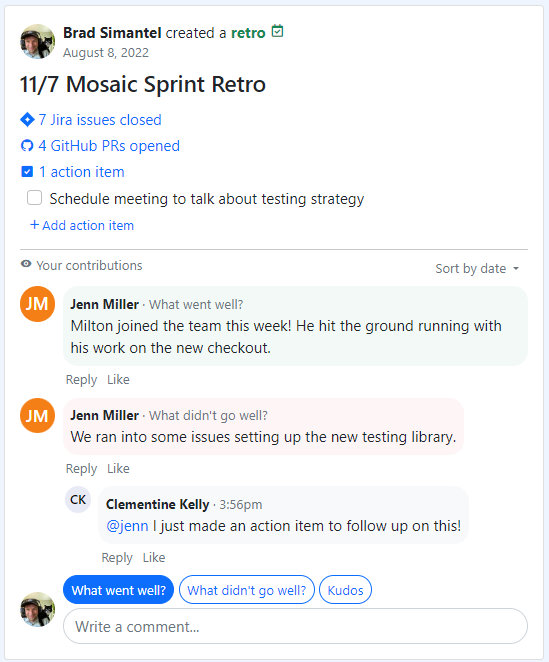
The workflow is incredibly simple—just create a retro, set your prompts (or use ours), notify your team via Slack, and watch as the discussion flows. Teaminal automatically pulls in completed work from integrated tools like Jira and GitHub to jog memories and spark conversation.
You can also jot down action items to follow up on, monitor progress with real-time updates, and optimize your entire Agile workflow with async daily standups, planning poker, reports, and more.
Key Features
-
Slack-Based: Use Slack to run or participate in retrospectives without switching tools.
-
Asynchronous Retrospectives: Let your team participate in retrospectives on their own schedule.
-
Customizable Prompts: Set your own prompts to generate more targeted insights into specific aspects of a sprint.
-
Deep Integrations: Integrate with tools like Jira and GitHub to gain context and visibility into team performance.
-
Actionable Insights: Analyze team sentiment and engagement data through reports to identify trends and address recurring issues.
-
All-In-One Agile Meeting Platform: Access asynchronous tools for all Agile rituals, including daily standups, planning poker, backlog grooming, reports, and more.
Pricing
Teaminal’s price ranges from free to $12/user/month.
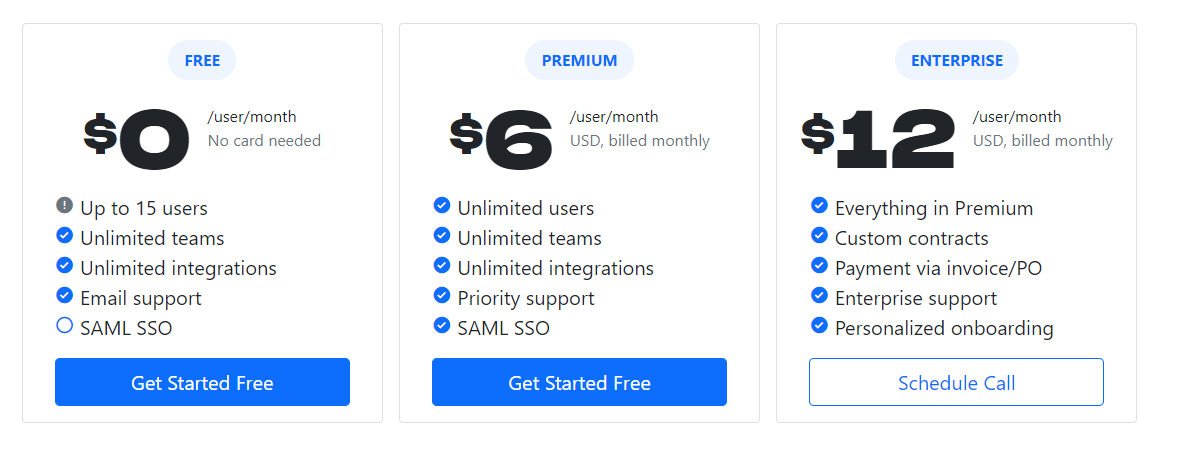
The free plan offers full access to the platform for 15 users. Premium ($6/user/month) and Enterprise ($12/user/month) provide unlimited user support, with Enterprise offering additional benefits such as personalized onboarding and custom contracts.
Pros and Cons
Pros
-
Supports all Agile ceremonies
-
Integrated with Slack
-
Custom prompts for targeted insights
-
User-friendly interface with seamless navigation between features
-
Great reports and visualizations
Cons
- Email support only on the free plan
2. Parabol
Parabol is an Agile meeting tool that supports retrospectives (along with sprint planning, planning poker, daily standups, and team check-ins).
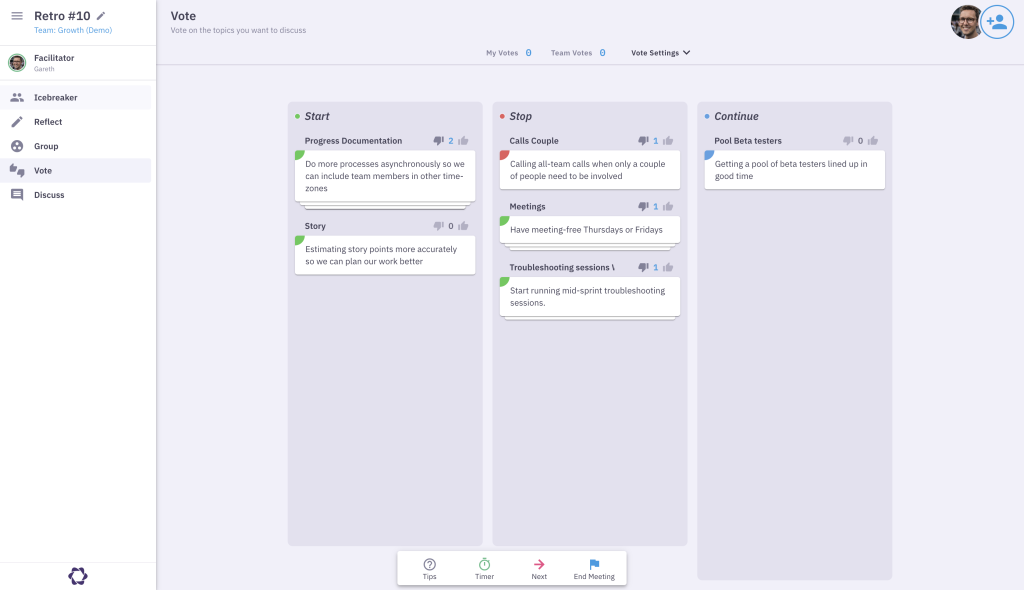
The retrospective tool features a number of prebuilt templates, but you’re also free to customize your own. Team members can then respond to prompts either anonymously or by name in real time during the meeting, and then vote on different responses to help with prioritization.
Key Features
-
Anonymous reflections: Empowers team members to freely share their thoughts and feedback without concerns about judgment or reprisals.
-
Interactive multiplayer grouping: Allows team members to collaboratively group related cards.
-
Voting: Enables team members to express their opinions on the most crucial issues.
-
AI-powered analysis: Generates valuable insights about team performance from online collaboration activity.
Pricing
Parabol has three plans—Starter, Team, and Enterprise.
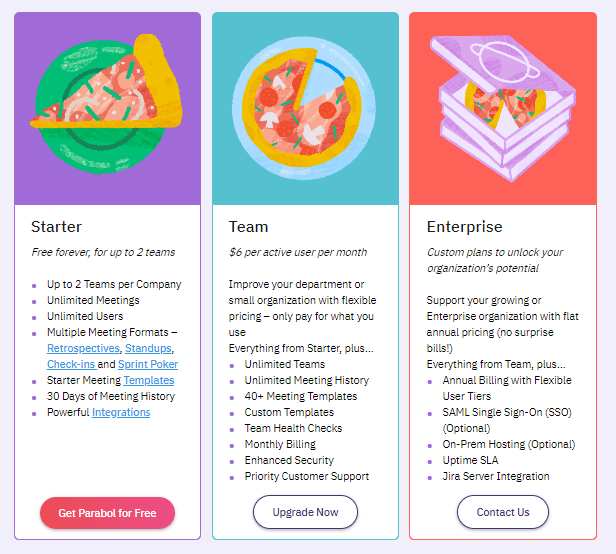
Starter is free forever and supports up to 2 teams per company and unlimited meetings. Team ($6/user/month) includes unlimited teams and meeting history, along with additional features like custom templates and enhanced security.
Enterprise (custom) includes all the features in Team, as well as extras like SAML SSO and Jira integration.
Pros and Cons
Pros
-
Simplifies identification of patterns and themes.
-
Ensures a democratic and inclusive retrospective process
-
Seamlessly integrates with tools such as Jira, GitHub, and Slack
-
Provides a quick and efficient way to review discussions and outcomes
Cons
-
Pricing structure may be considered expensive
-
Requires a learning curve
-
Limited integrations
-
Limited customization
3. Retrium
Retrium is a dedicated retrospective tool that gives teams a wide range of pre-built retrospective templates to choose from. These templates are designed to help teams identify patterns, analyze data, and make informed decisions for continuous improvement.
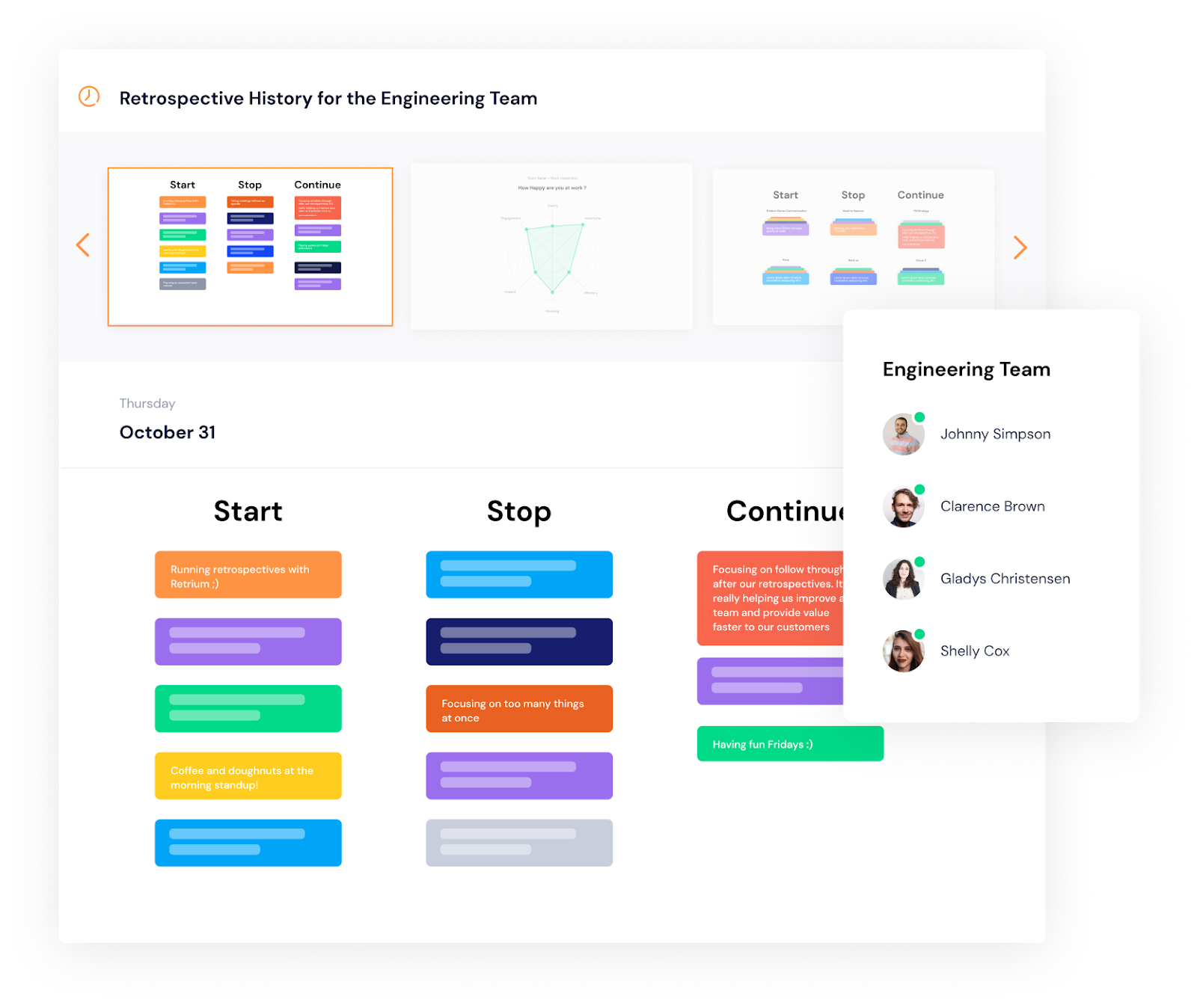
From Sailboat and Starfish to Mad Sad Glad and Four Ls, Retrium offers a variety of interactive templates that cater to different types of teams and projects. That said, customization isn’t a major priority with this tool.
Key Features
-
Range of templates: Offers 15+ retrospective templates to choose from, each with a unique focus and purpose.
-
Easy-to-use interface: The drag-and-drop interface makes it easy for teams to collaborate and share ideas during the retrospective.
-
Action plan: Effortlessly transform ideas into experiments and track follow-through with facilitator notes and action items.
-
Anonymous reflections: Empowers team members to freely share their thoughts and feedback without concerns about judgment or reprisals.
Pricing
Retrium offers three pricing plans—Team, Business, and Enterprise.
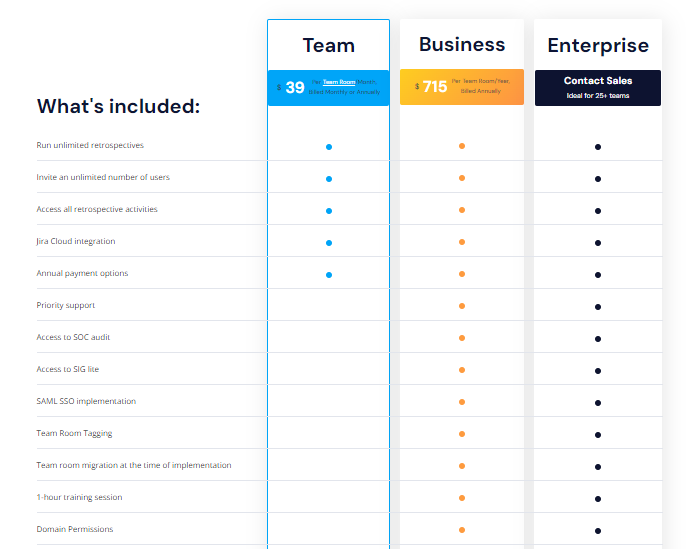
Team ($39/team/month) offers full access to retrospective features. Business ($715/team/year) offers personalized onboarding, SSO, and more. There’s also Enterprise (custom) for large teams with specific needs.
Pros and Cons
Pros
-
Allows seamless customization
-
Simplifies **the identification of areas for improvement
-
Provides an opportunity for reflection on the journey and team progress
-
Ensures that every team member has a say in the retrospective
Cons
- Some users find the licensing model challenging
4. GoRetro
GoRetro is a user-friendly and adaptable Agile retrospective tool that harnesses sprint data and team sentiment to foster continuous improvement. Offering unlimited boards, teams, and ready-to-use templates, it streamlines the initiation of your meetings.
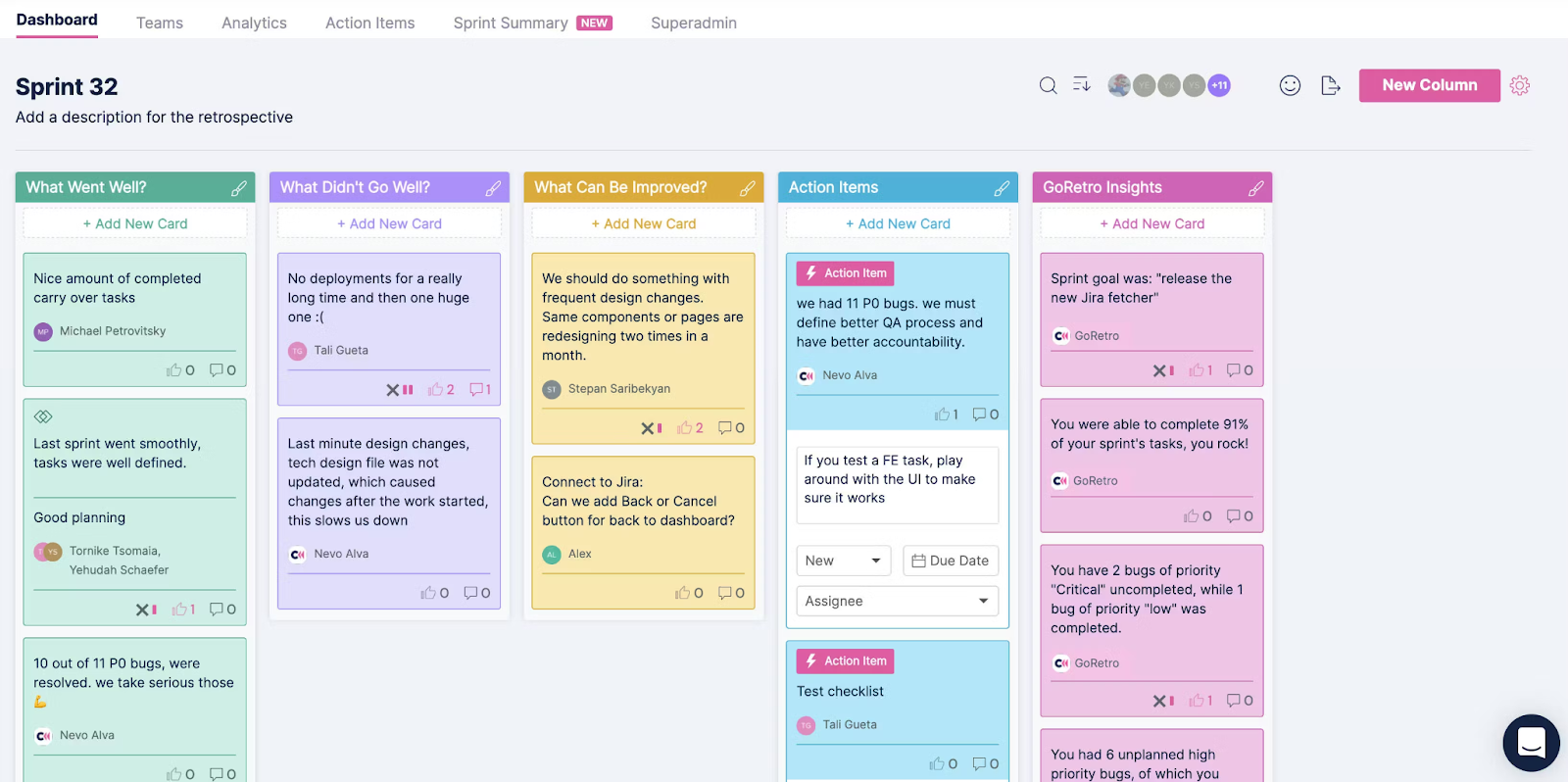
GoRetro’s collaborative features add a fun and engaging dimension to retrospectives, ensuring productivity. Through deep data integrations, GoRetro empowers teams to take charge of existing data from tools and past sprint retrospectives, accelerating decision-making and transforming into a data-driven unit.
Key Features
-
Customizable templates: Offers a wide range of templates to choose from, or create your own for a personalized experience.
-
Automated reminders: Guarantees that retrospectives are completed on time and keep teams on schedule.
-
Analytics and reporting: Enables you to monitor and assess the performance of your retrospectives over time.
-
Private sections: Allocates each participant with an individual private section in every column, allowing for independent idea development.
Pricing
GoRetro offers three pricing plans—Free, Premium, and Sprint Pro. The free plan allows one team to run unlimited retrospectives at no cost.
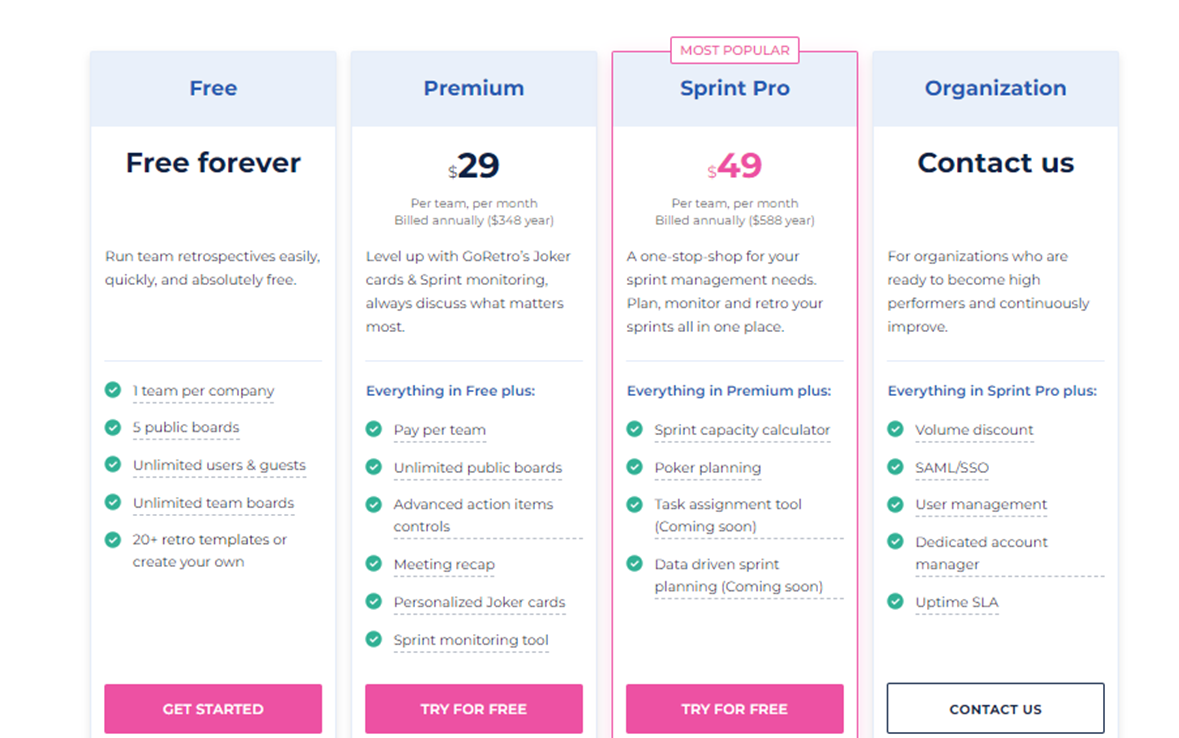
Premium ($29/team/month) offers additional features like advanced action item controls and personalized Joker cards. Sprint Pro ($49/team/month) includes features like a sprint capacity calculator and poker planning.
There’s also a custom Organization plan for large teams.
Pros and Cons
Pros
-
Easy to use and navigate
-
Ability to create unlimited retro boards with customizable templates
-
High standard of data security
Cons
-
Limited free plan
-
Some users have encountered minor bugs
-
Long column management can be tedious
5. Metro Retro
Metro Retro is a whiteboard tool designed specifically for remote retrospectives. It offers a simple, user-friendly interface with drag and drop functionality for organizing ideas. Users can get started quickly with 40+ retro templates, or build their own for custom retrospectives.
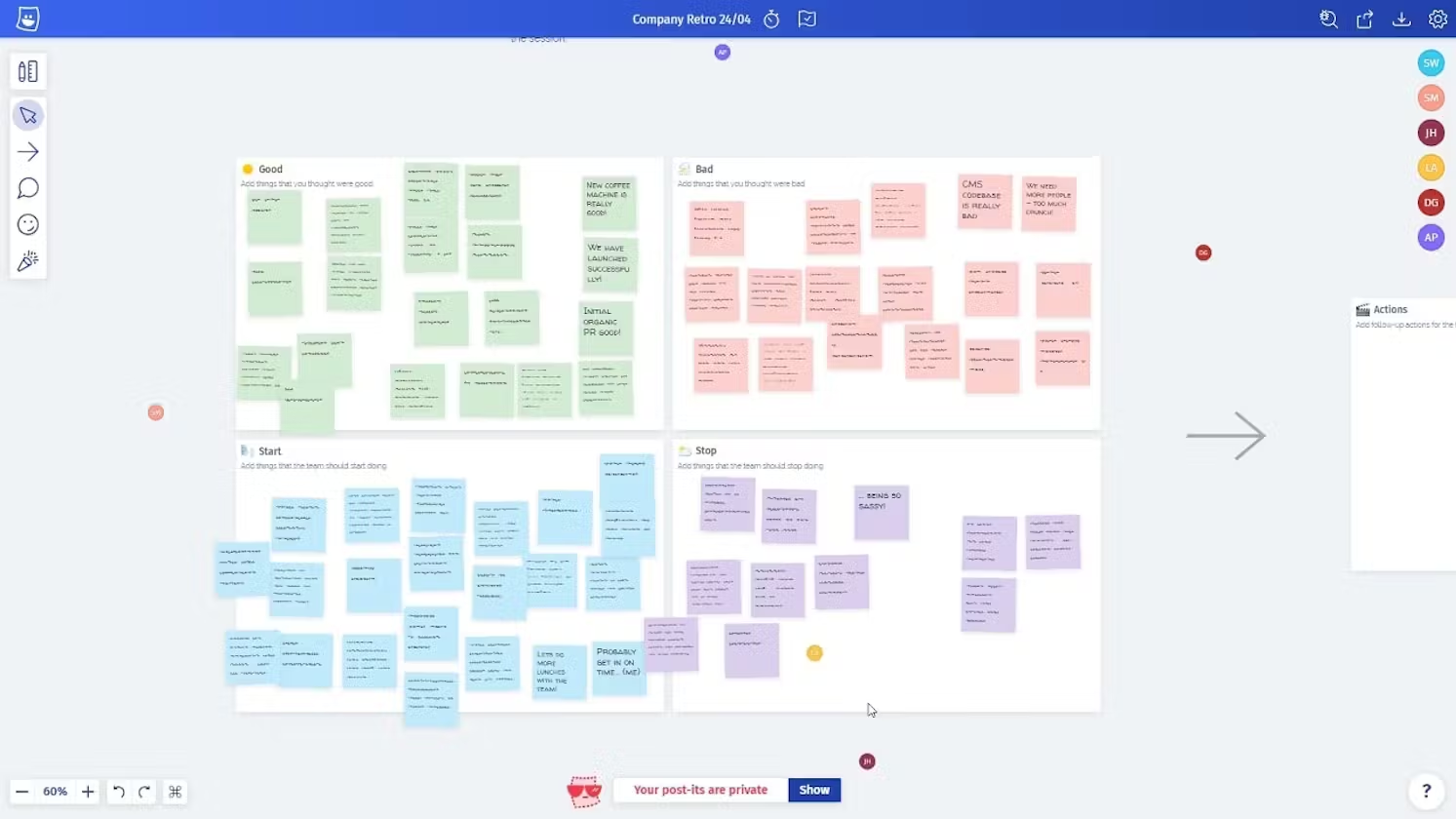
Some standout features of Metro Retro include the ability to add images and GIFs, use sticky notes for brainstorming, and draw directly on the board with a virtual pen.
Key Features
-
Interactive whiteboard: Add your team’s ideas and comments in real-time with drag and drop functionality.
-
Customizable templates: Choose from over 40 pre-made templates or create your own for a personalized retro experience.
-
Image and GIF support: Spice up your retrospectives with visual aids to help convey ideas.
-
Virtual pen tool: Draw directly on the board to highlight important points or add illustrations.
Pricing
Metro Retro offers three plans—Free, Pro, and Business. The free plan allows small teams to use Metro Retro for free (with usage limits).
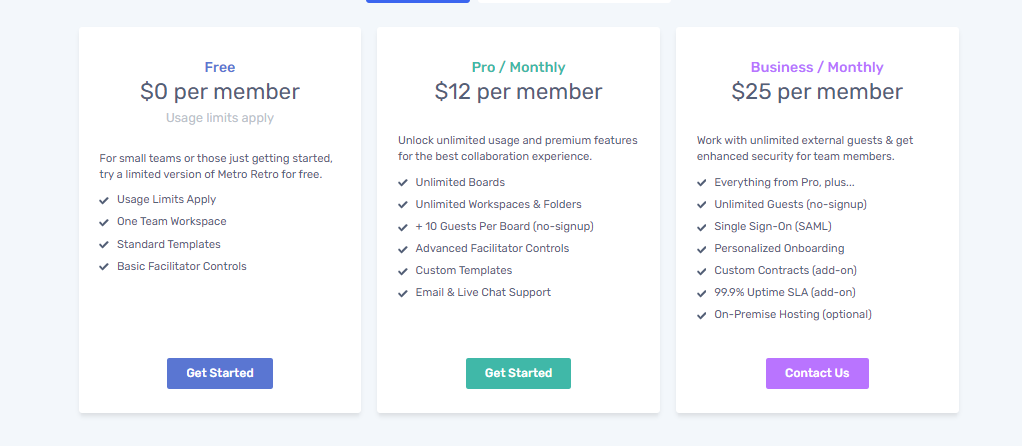
Pro ($12/user/month) provides unlimited boards, workspaces, and folders, along with advanced facilitator controls and email and live chat support. Business ($25/user/month) includes unlimited external guests, enhanced security, and additional options like custom contracts and on-premise hosting.
Pros and Cons
Pros
-
Playful and fun design
-
Intuitive interface is easy to use
-
Enhanced collaborative features
Cons
-
Limited to retrospectives
-
Limited product templates
-
Not Ideal for long-form writing or traditional project management
6. EasyRetro
EasyRetro is a simple tool designed to facilitate virtual sprint retrospectives. While it’s fairly basic compared to other tools on this list, that makes it an affordable and easy-to-use option for smaller teams.
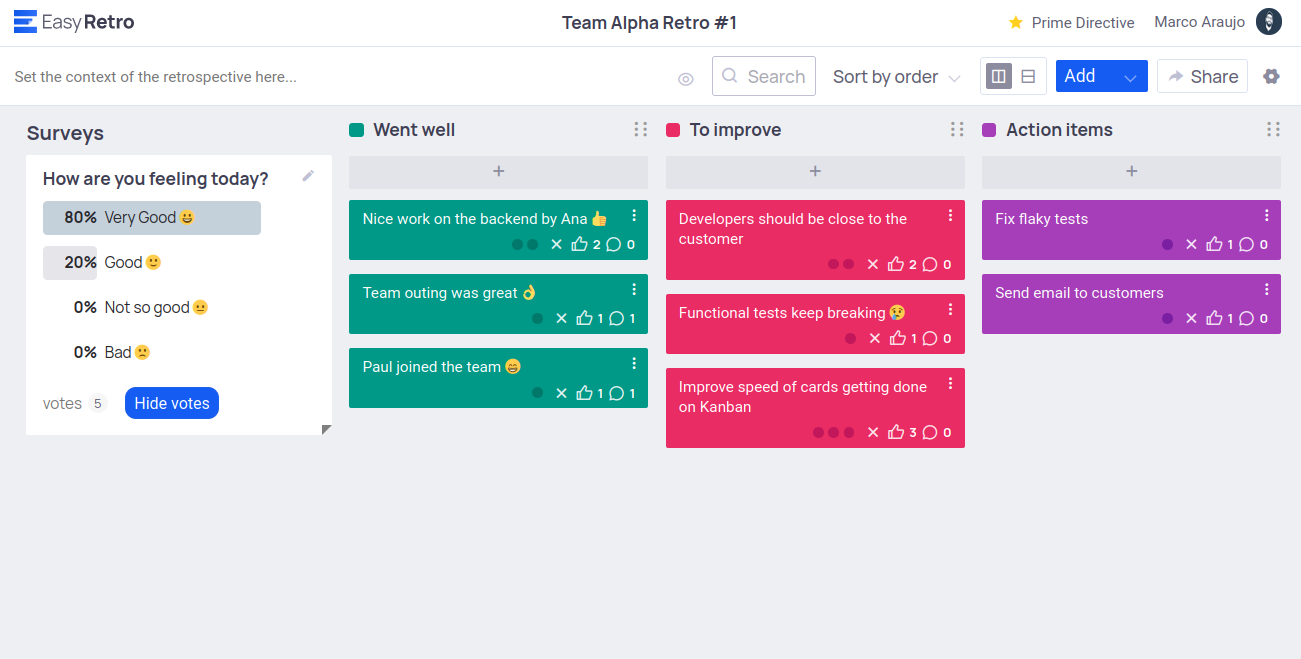
Key Features
-
Easy setup: Get a board up and running in just a few minutes.
-
Voting and sorting: Participants can vote and sort ideas to prioritize them.
-
Retro histories: View past retrospectives to see how your team has progressed over time.
-
Customization: Choose from different pre-made templates or create your own for a personalized experience.
Pricing
EasyRetro offers four pricing plans—Free, Team, Business, and Large Business. The free plan lets users create three boards per month and limits access to key features.
Team ($25/month) provides access to more advanced features and more boards per month. Business ($60/month) expands these limits further and offers more teams. Large Business ($90/month) offers the highest number of boards and teams, as well as access to all features.
Pros and Cons
Pros
-
Straightforward and intuitive interface.
-
Focused features for retrospectives
-
Suitable for remote teams
Cons
- Limited features
7. Scatterspoke
ScatterSpoke is a powerful retrospective tool designed to offer in-depth insights into your team’s well-being, productivity, and areas for improvement. It enables team members to express their feedback visually, transforming it into visually appealing and informative graphs.
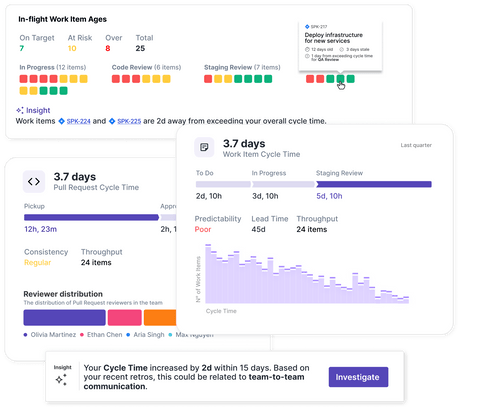
Key Features
-
Customizable templates: Offers a range of templates that can be tailored to suit the team’s specific needs.
-
Real-time feedback: Enables team members to provide feedback in real-time
-
Anonymous feedback: Allows team members to submit feedback anonymously
-
Data visualization: Aids in recognizing trends and patterns within the feedback.
Pricing
ScatterSpoke offers three pricing plans—Starter, Business, and Enterprise. The Starter plan is free and includes up to 50 members with unlimited retrospectives.
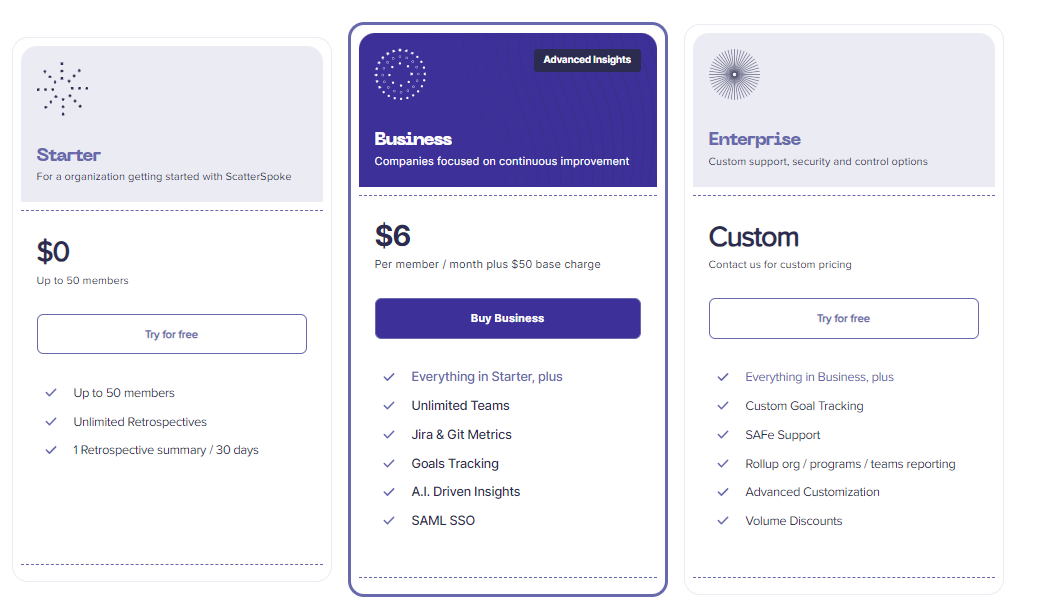
Business ($6/user/month + $50 base charge) includes additional features like unlimited teams, Jira & Git metrics, goals tracking, AI-driven insights, and SAML SSO. Enterprise offers custom support, security, and control options, with pricing available upon request.
Pros and Cons
Pros
-
Provide insights and analytics
-
Simple and easy to set up
-
Offers a range of formats for retrospectives
-
Ability to track action items from one retrospective to the next
Cons
-
Limited free version
-
Presents a steep learning curve for new users
-
Paid plans could be expensive for smaller teams
8. TeamRhythm by Easy Agile
TeamRhythm by Easy Agile is a user-friendly and agile solution that seamlessly integrates with Jira to transform your backlog into prioritized and actionable tasks. With features like sprint planning, stand-up notes, and retrospective templates, TeamRhythm helps teams stay organized and focused on delivering quality work.
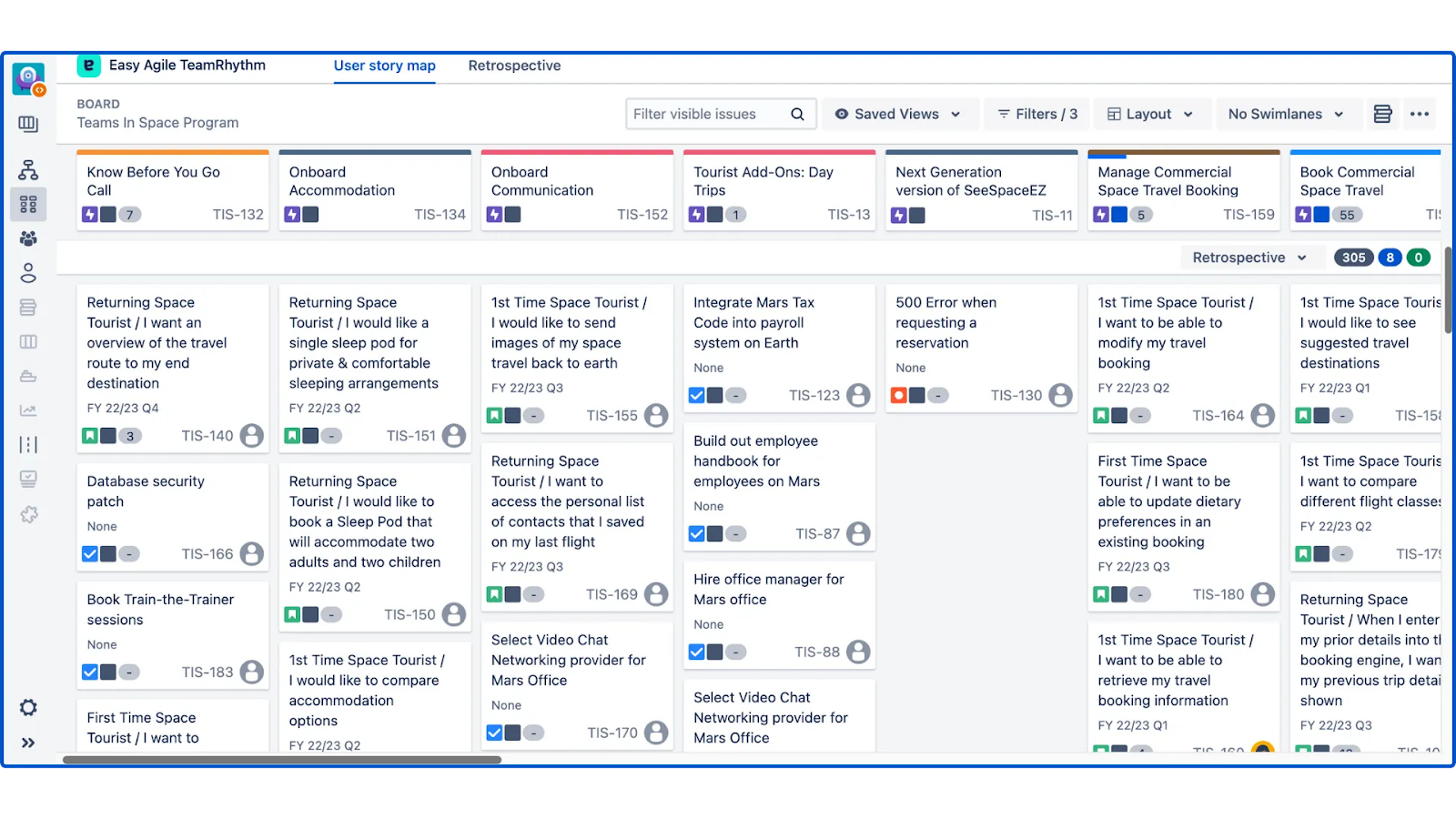
Key Features
-
Visual story map format: Offers a visually rich context for sprint and version planning, backlog refinement, and user story mapping, tightly integrated with Jira.
-
Retrospective boards: Seamlessly incorporates team retrospectives for both scrum and kanban boards, aligning them seamlessly with your Jira tasks.
-
Customizable templates: Provides a diverse array of templates that can be tailored to meet the specific needs of your team.
-
Real-time feedback: Empowers team members to contribute feedback in real-time.
Pricing
TeamRhythm is free for up to 10 uses. After that, pricing depends on the size of your team (each user costs $2.80/month).
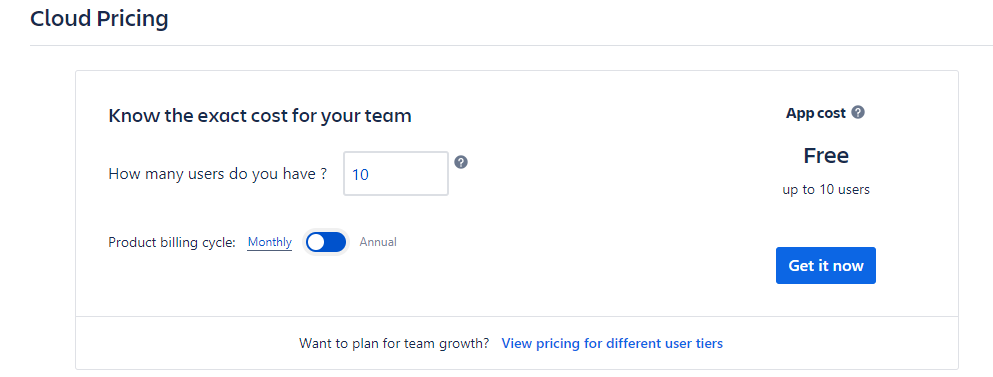
Pros and Cons
Pros
-
Impactful, visual representation in Jira
-
Easy story mapping
-
Customer-centric approach
-
User-friendly interface
-
Jira integration
Cons
- Difficult to manage multiple teams
9. Reetro
Reetro is a freemium online retrospective tool designed to enhance Agile processes for teams. It features a diverse range of customizable templates, real-time feedback mechanisms, and the option for anonymous feedback.
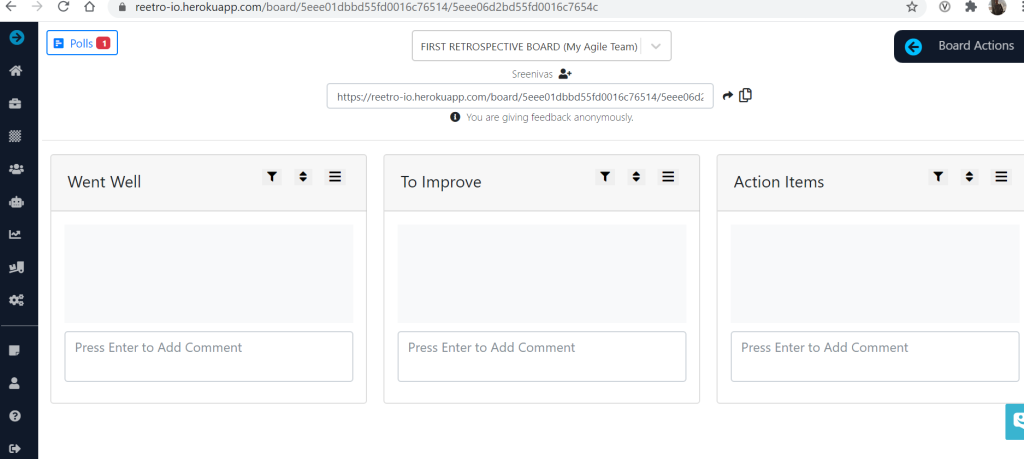
Key Features
-
Action item tracking: Allows efficient tracking of action items from retrospectives for better accountability.
-
Unlimited teams and boards: Users can create an unlimited number of teams and boards for various projects or teams.
-
Unlimited user invitations: Facilitates the inclusion of any number of team members for collaborative retrospectives.
-
Public/private board options: Provides flexibility to make retrospective boards either public or private.
Pricing
Reetro offers three pricing plans—Free, Pro, and Enterprise. The Free plan is forever free and includes unlimited teams and boards, limited features, and limited support.
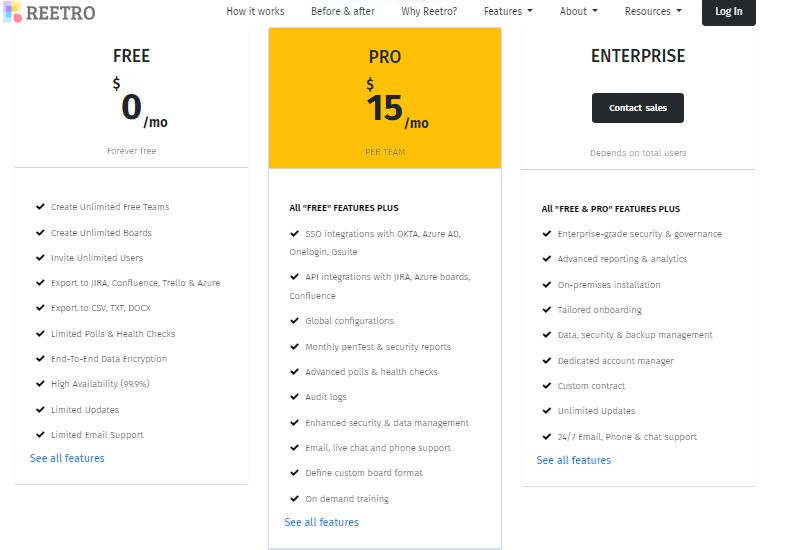
Pro ($15/team/month) includes advanced features like SSO integrations, API integrations, enhanced security, and email, live chat, and phone support. Enterprise (custom) offers additional features like enterprise-grade security, on-premises installation, tailored onboarding, unlimited updates, and 24/7 email, phone, and chat support.
Pros and Cons
Pros
-
Ensures accountability and record-keeping
-
Supports anonymous feedback during retrospectives
-
Seamless integration with Jira
Cons
- Limited features
10. RetroTool
RetroTool is another freemium online retrospective tool that offers a simple and intuitive platform for teams to gather feedback and improve their processes. The free plan includes basic features like unlimited retros, team members, and boards.
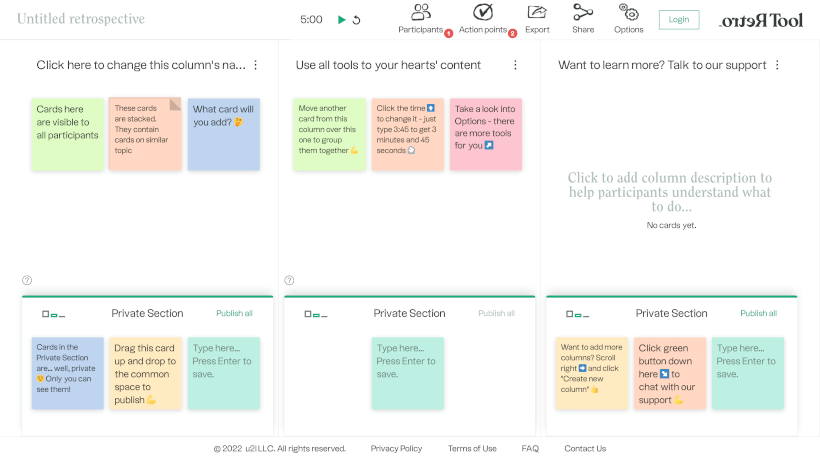
Key Features
-
No-signup: Create your first retro board without signing up for an account.
-
Ready-to-use templates: Offers a range of templates for different retrospective needs.
-
Unique, secure links for boards: Each board has a unique URL for easy and secure sharing.
Pricing
RetroTool offers three plans—Anonymous (free), Individual ($10/team/month), and Company ($20/team/month).
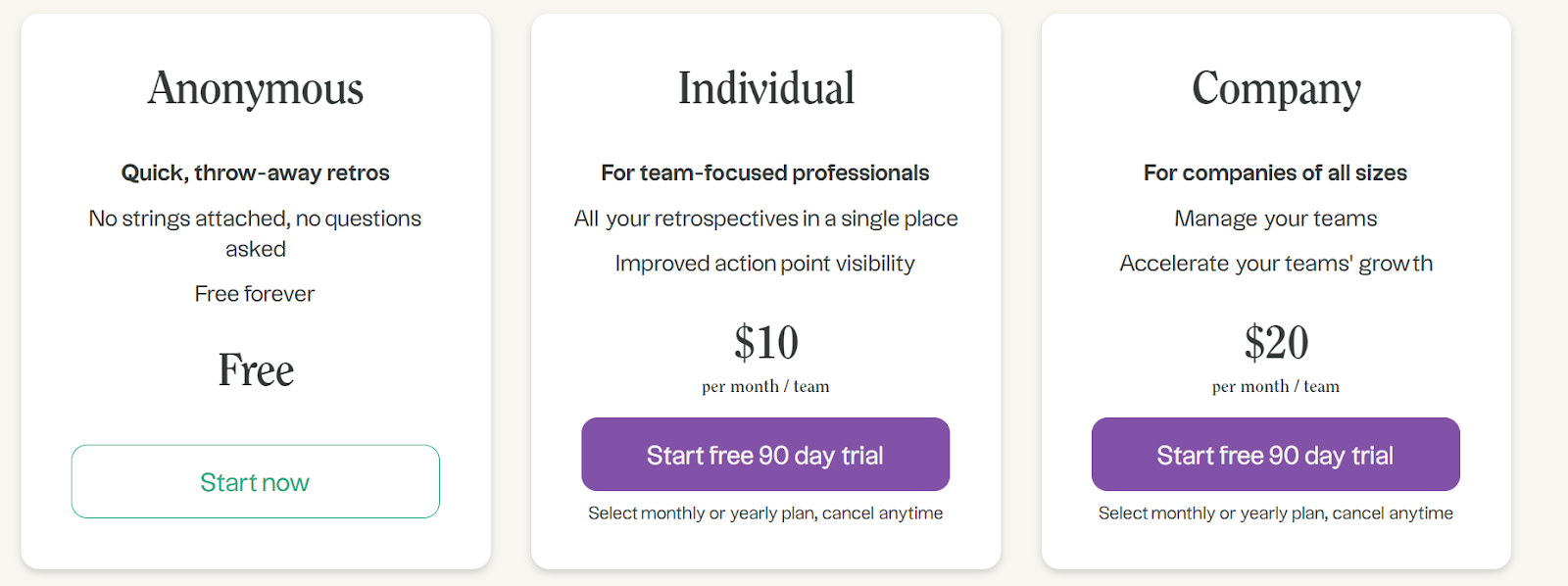
The free plan allows for anonymous retros with basic facilitation tools, while Individual offers advanced facilitation tools and extended customization options. Company includes additional features like managing unlimited teams and zero-knowledge encryption with custom passwords.
Pros and Cons
Pros
-
Purpose-built for sprint retrospectives
-
Balance of functionality and accessibility
-
Suitable for teams working with multiple clients worldwide
Cons
- Limited customization
Conclusion
Our exploration of the ten best Agile retrospective tools underscores the critical role these platforms play in optimizing team performance and fostering a culture of continuous improvement. These tools, ranging from improving communication to tracking progress over time, provide indispensable support for Agile teams seeking to maximize productivity.
At Teaminal, we offer distributed Agile teams a comprehensive solution that combines powerful features with a user-friendly interface. Our platform wins you hours of development time back through quick, async retros, daily standups, planning sessions, and more.
Sign up for free today.

